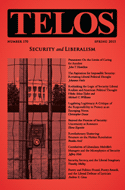Populism has now arrived in China. As opposed to the 1989 protests driven by students as well as an intra-government political struggle, the current unrest, while including students, has been driven much more clearly by a broader mass of people who have grown frustrated with the bureaucratic overreach of the zero COVID policy. With the largest and most comprehensive system of bureaucratically organized surveillance, management, and domination of the populace in the world, China has certainly been ripe for such populist revolt. While the original theory of the new class was developed by Milovan Djilas in order to explain state socialism in the Soviet Union, the populist reaction to the new class has up to now been associated mainly with liberal democracies whose state bureaucracies are still relatively undeveloped when compared to the Chinese version. The Chinese state receded somewhat during the reform and opening up period, but the rule of Xi Jinping, the growth of the surveillance state, and especially the zero COVID policy have led to new extremes in the level of new class management of the population. Moreover, the lockdowns and their economic effects have highlighted the divide between the new class and the broader populace. As one protester shouted to the police, the police are state functionaries with stable incomes while most of the people are dependent on the flourishing of a market economy that has been throttled by the COVID lockdowns.
|
It is probably prudent to start with a clear affirmation that the pandemic is real, that COVID-19 has taken many lives, and that public health measures have been necessary to try to limit the devastation of the disease. No denying here. But it is also evident that the messaging by health authorities has often been confusing, and that has undermined their own credibility: for example, in the shift from initial advice against wearing masks to the current (if inconsistent) mandate to do so. If the science on a particular question is not fully settled, it might be better for the authorities to be honest about that indeterminacy rather than to lay claim to an infallibility they cannot maintain. That clarity, however, would mean a willingness to trust the public to think on its own and to act in the spirit of individual responsibility, instead of issuing orders and vilifying critics. In response to a speech given by Obama in 2013 on his administration’s counterterrorism policy, popularly referred to as his “drone speech,” General William Nash commented that Obama “has begun the transition from a perpetual war to a more normalized security framework.” I address this normalization of the categorization and control of life within a global threatscape. Much of the debate at policy level, in academia, and on the flickering screens of media outlets surrounding the contemporary fixture of the counterterror arsenal, the drone, focuses upon the legal and ethical implications. Administration officials continually stress the need for “transparency” and the president’s wish that the United States hold itself to “the highest possible standards” in the conduct of a just, humanitarian war—reminding us this is indeed a war, against an organization and its affiliates. Recent initiatives to utilize household and personal mobile technologies to further specific security, surveillance, and counter-terrorism objectives pose significant challenges to civil liberties and personal well-being. The social and political statuses of these technological systems are just emerging: they are rapidly being infused into home settings and mobile devices, apparently under the control of users but under at least the partial monitoring and operation of various governmental and corporate entities. Individuals are being increasingly surveilled by sets of security-related mechanisms in their home automation and mobile communications devices as well as by other manifestations of the “Internet of Things” (IoT). |
||||
|
Telos Press Publishing · PO Box 811 · Candor, NY 13743 · Phone: 212-228-6479 Privacy Policy · Data Protection Copyright © 2025 Telos Press Publishing · All Rights Reserved |
||||



